Creating a beautiful business video takes talent, time, and resources. Whether you’re producing your video in-house or with an outside team, the process can be expensive and time-consuming. The biggest problem is that after all the blood, sweat, and tears to produce a phenomenal final product, a big piece of the puzzle is often overlooked…the promotion strategy.
Perhaps, you’ve gotten really great at promoting your blog content – but marketing video content is a whole new beast. But we know video content resonates incredibly well with audiences. Just including a video on your landing page can increase conversions by 80%! So, the time is worth it, but you need to take the time to drive people to find, play and watch your video.

Below I’ve outlined 9 video marketing tips to get your video views way up so you know the effort of producing a beautiful product was not wasted.
#1: Optimize Your Video Thumbnail with a Smile
The video thumbnail is by far the most important component to drive a visitor to play or not play your video. The reality is, we do judge books by their cover, which is why you need to dress your video for the occasion by giving it a compelling, play-worthy thumbnail image.
The greatest way to ensure people play your video is by using an image of a smiling human making direct eye-contact. Why? People relate to other people. Would you rather open a book with a bunch of boring text on the cover or one with an image of Prince William smiling at the camera? The latter is more compelling, and the same theory applies to video thumbnails.
“Smiling is the outward manifestation of happiness and serves to begin to connect us to others,” says Dr. Adrian Furnham, and organizational and applied psychologist.
So smack a smile on your video’s thumbnail, and you’ll likely see a much higher number of plays.
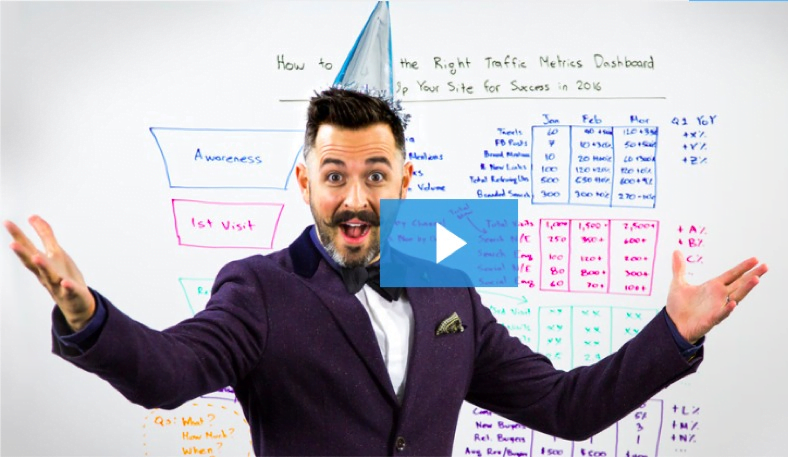
#2: Run a Video Campaign on Facebook or Twitter
What better way to drive people to your video than offering something for free? The best place to do this is on social networks where people are more likely to share and spread the word about your giveaway, in turn leading more people to your landing page, and ultimately driving more people to play your video. Check out this example below from the company Dockwa.

After clicking on this giveaway offer, I’m then directed to a nice landing page with a video explaining the boating service they offer.
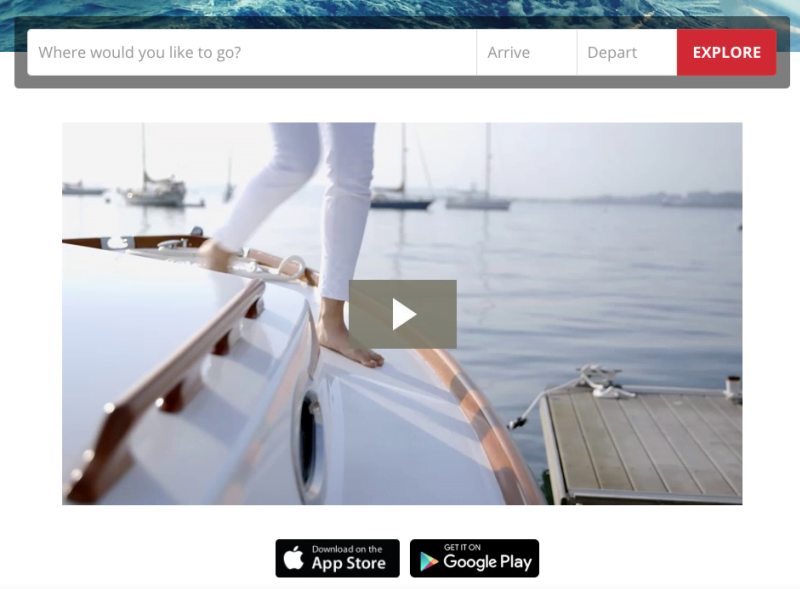
For more help with Facebook and Twitter video campaigns, check out our post on how to use personalized video marketing to boost engagement.
#3: Add Share Buttons to Your Video Player
We’re all keenly aware of how powerful social media is. In fact, you likely start and end your day on SnapChat, Instagram, Facebook, or Twitter. It’s might be sad, but it’s true, which is why you need to ensure your video can be easily shared on these platforms.
WordStream uses the Wistia video player to host most of its marketing videos. One cool thing about the new Wistia player is that you can add share buttons directly within the video itself so that interested parties can share out a link to the video (which directs back to your website) without having to leave the player.

#4: Shamelessly Ask People to Share Your Video
I realize that just asking people to share your video might seem obvious, but I can (almost) guarantee that if you put yourself out there, your friends will share your content and help you spread the word. So ask your friends, colleagues, former colleagues, industry connections, brothers-in-law, nephews and nieces. Of course asking the contacts who are likely closely connected to your target market is the strategic place to start, but you never know who is connected to who, and a share can go a long way so don’t limit the people you ask.
Back in May I spoke at an event with an agency partners in Minneapolis. After enjoying some seafood and cocktails one of the employees who hosted the event began gushing about this video they’ve been working on, mentioned that the landing page would be live tomorrow, and asked if I would share it. And guess what, I shared it! She even followed up on Twitter when it was published. This person whom I had known for less than a week was able to get me to share something just by asking – so you can see how easy this is to do.
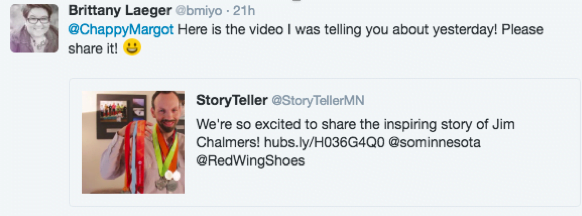
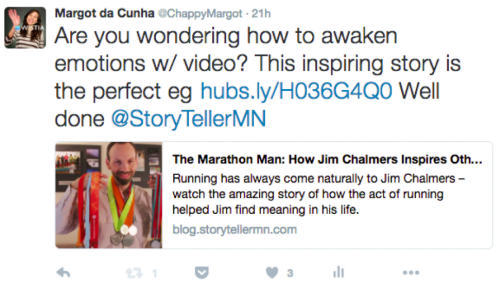
#5: Marry Video to Your Email Marketing Efforts
Video and email are a match made in marketing heaven. Just adding the word “video” in an email subject line boosts open rates by 19%, click-through rates by 65% and reduces unsubscribers by 26%, according to Animoto.
Adding a video thumbnail into your email also boosts the engagement of that email. At Wistia we found a 300% lift in CTR when using a video thumbnail over a plain image.

Not only is it easy and free to incorporate videos into your on-going email nurture campaigns, but it also can lead to better attribution. For instance, if you’re using Wistia with HubSpot, Marketo, Pardot, or SalesForce, you can actually pipe video viewing data directly into your lead scoring and workflows.
Let’s say one of your leads views 75% of a product demo video on your website, you could then set-up a workflow to email that person or alert a sales rep to call that individual.
#6: Put Some Money Behind Promoting Your Video on Social
A lot of the tips so far have been wallet-friendly (for more wallet-friendly video help, check out this post on how to create at-home DIY marketing videos), but now it’s time to scrape out the quarters from the bottom of your backpack and put some cash behind your video marketing strategy.
It actually won’t cost you an arm and a leg to promote your video on platforms like Facebook and Twitter, and if you pay attention to the audience and campaign settings you could run a very successful promotional campaign and drive the right people to your content, yielding a delightful ROI. Check out this guide to launch your first Facebook video ad campaign.
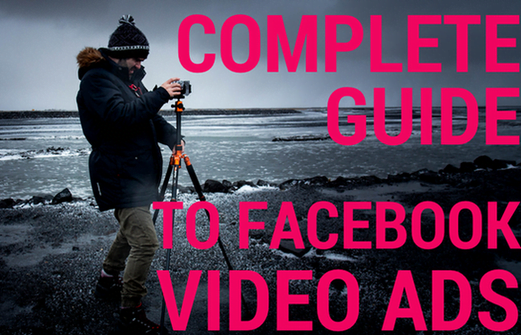
#7: Play Your Video at an Event
We’ve all sat through dull speeches at industry events where we spend the entire time either staring into space, scrolling through our Instagram feeds, or hopelessly trying to keep our eyes open. But there’s nothing worse than being on the other end. If you’re presenting and notice your audience nodding off your nerves will likely go to a whole new high. A great way to combat this is by playing a video!
Not only does a video give you a break from presenting, but it gives the audience a break from listening to you present. Even the best presenters on the TED stage use videos to break up their speeches because it helps refuel the audience.

Image via TED.com
Listening to the same person for an extended period of time can become unengaging (regardless of how engaging the speaker is), which is why industry events are a great opportunity to promote your video content to a large and relevant audience. Of course, you’ll want your video to be top-notch for this one so it may be worth investing in video editing software.
#8: Pin Your Video to the Top of Your Twitter Feed
By pinning a tweet to the top of your personal or company Twitter feed, you ensure that tweet doesn’t get lost in the new tweets you’re consistently posting. It also will drive even more engagement to valuable video tweets.
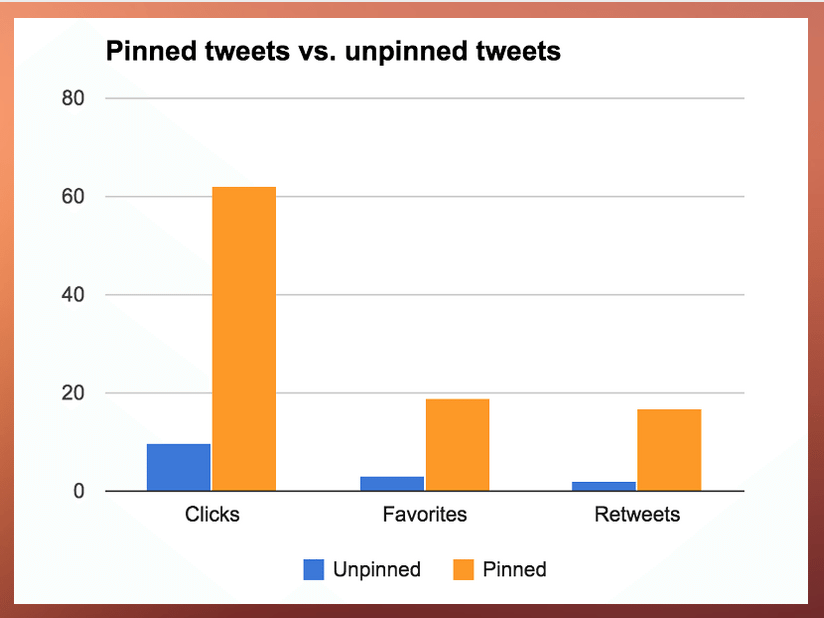
Image via Buffer
Buffer found that pinning a Twitter card led to a 10X increase in conversions! This is a free and easy way to drive more video views, so pin it, and watch the plays flood in.
#9: Share Your Video in Online Communities
Whether it be a Twitter chat, LinkedIn group, Reddit, or a popular online community created in your industry, you should be actively engaging in these realms and spreading your video content when relevant. Let’s say you work for an inbound marketing agency and are participating in a conversation where several people seem to be struggling with their inbound efforts. Share your explainer video to answer their questions and show how you can help them in a truly engaging manner.







